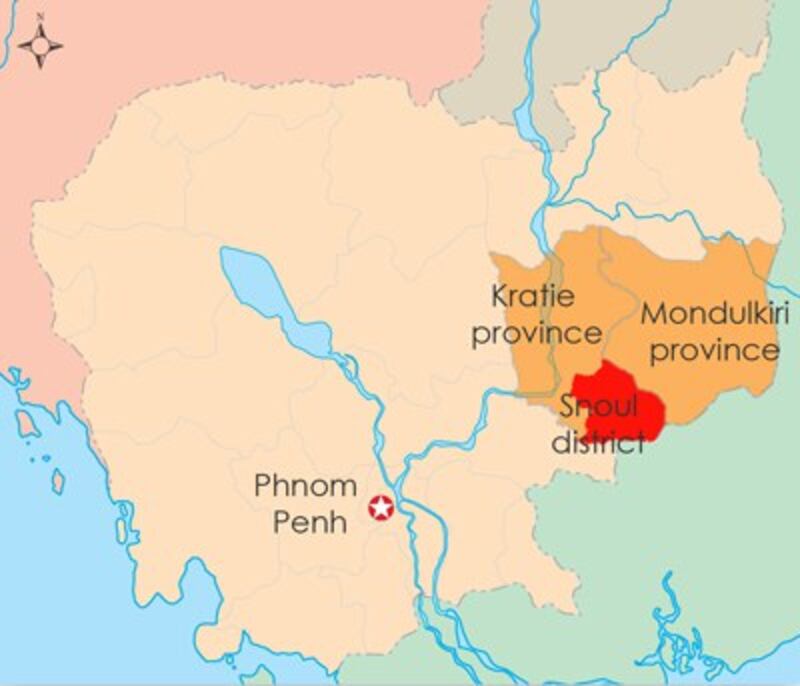Cambodian Prime Minister Hun Sen on Tuesday vowed to revoke any land concession given to a developer who uses violence against villagers after a group of military officers shot and injured as many as six villagers peacefully protesting a forced eviction.
The prime minister also called on officials to cancel any concessions around the country granted to developers who were found to have encroached on villagers’ property.
“We will take the license back if the company provokes violence,” he told reporters while attending a road inauguration ceremony with China’s ambassador in Mondulkiri province.
The announcements followed protests from domestic and international rights groups who accused the government of complicity in land grabs and military brutality following the Jan. 18 shooting incident in Cambodia’s eastern Kratie province.
As many as six villagers in Snoul district were wounded, two severely, after being shot by a group of military personnel hired by developer TTY Company to carry out a forced eviction, according to witnesses and local officials.
The incident immediately drew condemnation from Cambodian rights groups Adhoc and LICADHO, which said the government should review its policy of allowing military personnel to serve as private security guards.
After the shooting, villagers took to the streets in protest, blocking National Road 76, which runs from Snoul district into neighboring Mondulkiri province, and demanded that local authorities resolve their land dispute.
Villagers said that they had settled in the area since 2006 when they began to plant cassava and cashew nuts, and that TTY had only recently started to destroy their crops.

Investigation underway
Hun Sen said in a televised broadcast Tuesday that he had already assigned Minister of Interior Sar Kheng to lead an investigation into the shooting incident.
“I have already issued a firm order against any shooting sprees against villagers,” Hun Sen said.
“I take this opportunity to appeal to the perpetrators to come out and confess before the law. You cannot escape from the law no matter where you hide,” he said.
The prime minister also ordered an investigation into why TTY, a company owned by his advisor and prominent business tycoon Okhna Namarady, had armed its security guards during the eviction.
“Where did they get the weapons from?” Hun Sen asked. “We should not allow any violence. I am saddened by this kind of incident and regard it as a very serious issue. We can’t let it go.”
“I condemn TTY Company. The company must hand over the perpetrators,” he said, adding that if the company protects the men, it would “get into trouble.”
Hun Sen also warned Namarady that he would be dragged to court if he refused to surrender the suspects. He also threatened to remove Namarady from his role as his personal advisor.
He added that each villager family involved in the land dispute with TTY was entitled to five hectares (12.5 acres) of land with the option of leasing additional land from the government in the same way a company granted a land concession might.
Ongoing issue
Cambodia’s land issue dates from the 1975-79 Khmer Rouge regime, which banned private property and forced large-scale evacuations and relocations throughout the country.
This was followed by mass confusion over land rights and the formation of squatter communities when the refugees returned in the 1990s after a decade of civil war.
Housing Cambodia’s large, young, and overwhelmingly poor population has posed a major problem ever since.
According to the Housing Rights Task Force, a Cambodian group monitoring forced evictions, an estimated 30,000 people a year in Cambodia are driven from farmland or urban areas to make way for real estate developments or mining and agricultural projects.
Reported by RFA’s Khmer service. Translated by Samean Yun. Written in English by Joshua Lipes.
